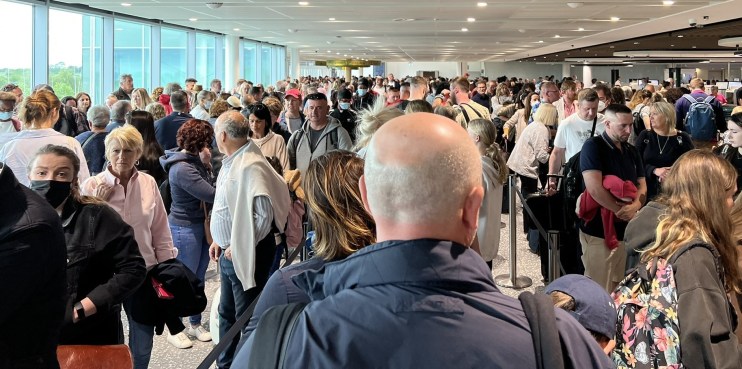Airlines axe hundreds of flights while ‘blame game’ between government and industry continues

Passengers have seen another day of disruption as airlines continue to axe hundreds of flights while the “blame game” between government and industry shows no signs of stopping.
British Airways (BA) today cancelled 124 flights from Heathrow and easyJet axed an additional 31 at Gatwick.
According to aviation analytics firm Cirium, easyJet was the most disrupted airline with 249 cancellations over the past week, 66 per cent of all UK cancelled flights.
Commenting on the situation, deputy Prime Minister Dominic Raab said the airlines were caught unprepared for the peak in demand.
“So I know there’s a bit of finger-pointing going on at the moment, but that’s the support and that’s the advice,” he told Sky News.
“I don’t think the airline operators have done the recruitment that they should have done, and taken the advice that the transport secretary gave them.”
Raab’s comments come as transport secretary Grant Shapps urged airlines to stop selling tickets for flight they cannot staff.
“Despite government warnings, operators seriously oversold flights and holidays relative to their capacity to deliver,” he said.
“This must not happen again and all efforts should be directed at there being no repeat of this over the summer.”
To ease pressures, stakeholders have been locked in talks with ministers over accessing tax records to help with recruiting staff more quickly.
Industry sources told the Times that by using HMRC records, the aviation sector could give clearance to more people in a shorter time.
According to one source aviation’s requests were “trying to address the fact that most people have had a number of small jobs with short-term contracts over the pandemic. We often need a five-year job history and if we are having to check with 15 or 20 employers . . . always one or two don’t come back to you.”
Recruiting more people is also set to help with staff morale, which is currently at an all time low as many workers believe shortages will lead to accidents and deaths.
Ministers have argued that the government is working alongside the industry but it was up to airlines and airports to make sure they had enough people to process the pent-up passenger demand.
“We are working with aviation sector in order to ensure that the queues we have seen at the airports are minimised and that disruption is minimised,” transport minister Andrew Stephenson told Sky News on Tuesday.
“It is for the airports to plan and recruit enough people in order to deal with the significant increases in people flying which we have been expecting for some time.”
easyJet have cancelled more than 250 over the last few days, while TUI announced yesterday it would cut six flights per day at Manchester airport until the end of June.
“The simple fact is that airlines and airports overcut staff during the pandemic, ignoring the fact that the billions of pounds of aid — including furlough — handed out by the government was meant to protect those very jobs,” the source told the outlet.
The government was not exempt from blame as it was accused of inaction.
Shadow transport secretary Louise Haigh who, in a letter addressed to Grant Shapps, blamed the government for being “missing in action.”
“We’ve been warning for months throughout the Covid pandemic that you can’t just let the airline industry and airports fall over, let them shed all of their staff, and then expect to get back on track when demand comes back after the pandemic,” shadow financial secretary James Murray told Sky News.
“We were warning about this, trade unions were warning about this, employee representatives were saying throughout the Covid pandemic ‘You need a sector-specific package to support the aviation sector’, and now we’re seeing what’s happened because the government hasn’t prepared for what would obviously come next.”
Consumer champion Which? urged both sides to stop with the “blame game,” as it is of “no help” to passengers.
According to Willie Walsh, IAG’s former boss and now at the helm of the International Air Transport Association (IATA), travel chaos needs to be put into perspective as it only involves a small amount of airports in the world.
“As airlines and airports try to rebuild, it is challenging for some of them … It will get addressed,” he told reporters during an industry conference.